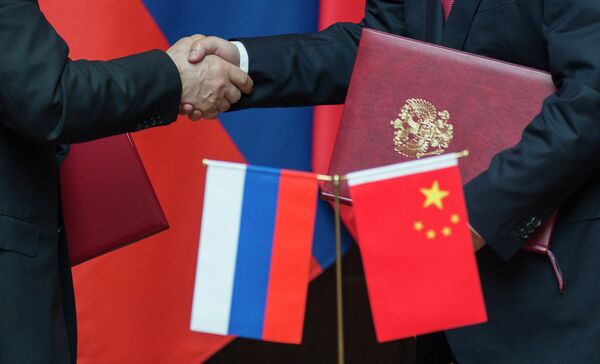MOSCOW, May 21 (RIA Novosti), Nikita Alentyev – Years of bilateral talks between Moscow and Shanghai on supplies of Russian gas to China finally peaked on Wednesday with the signing of the coveted contract, but the $400 billion deal is just the tip of the ‘market opportunity’ iceberg for Russia, Dr. Keun-Wook Paik, energy researcher, told RIA Novosti.
“People just think of the 38 billion cubic meters per year of pipeline gas supply to China, but this deal will help justifying the economics of Vladivostok LNG using the pipeline gas based on the Power of Siberia gas pipeline,” the senior research fellow at the Oxford Institute for Energy Studies said, concluding that “the signed deal will serve as the second game changer for the regional and global gas trading in the coming decades,” after US LNG export.
Dr. Paik did the math of possible associated gas projects in connection to the deal, should the conditions remain favorable. Adding up the production capacities of Vladivostok LNG, Sakhalin 1, prospectively expanded Sakhalin 2, Sakhalin 3, and a possible addition of exports from Altai, the best-case scenario “will provide Russia with a very attractive gas market with the volume of at least 100 billion cubic meters per year.”
“Considering Russia’s total gas export to Europe was 162 billion cubic meters per year in 2013, it is not a small volume,” Dr. Paik concluded.
François Godement, Director of the Asia & China Program of the European Council on Foreign Relations, voiced a different opinion on the promise of Sino-Russian energy trade ahead of the deal.
“I personally think it is gesturing, perhaps, on both sides, as the EU needs only few years to unlock other resources, including shale oil and gas from the US,” Godement said expressing his skepticism of Russia’s attempt to diversify away from European exports.
“Western Europe and the US do not want a conflict with Russia, so the US is tempted to act using sanctions, thinking it’s a softer line, something that will not necessarily escalate the situation, but it would put Russia on notice that it’s going too far. The risk of course is that we push Russia in a direction that is not at all conducive to our interests,” Godement concluded.
The energy aspect of Russia’s “non-conducive” is a further expansion into the Asian market, with Korea to be the first possible consumer of Russian gas, Dr. Paik believes.
He outlined the possible geography of future supplies, saying they “could open the door for the gas pipeline extension from Shandong province’s Weihai to Inchon, South Korea through the Yellow Sea, which is only 350 km distance. If the extension can be made, it will be the first trilateral or multilateral energy cooperation project in Northeast Asia,” he stated, categorizing the implicit benefits of Sino-Russian gas deal as a turning point for “Chinese domestic, regional and global gas supply trend.”
Russian Energy Minister Alexander Novak and Director of the Chinese National Energy Administration Wu Xinxiong signed an intergovernmental memorandum on the mutual understanding in gas deliveries field through the eastern route, following a contract of purchase and sale of natural gas between Gazprom and the China National Petroleum Corporation (CNPC).


